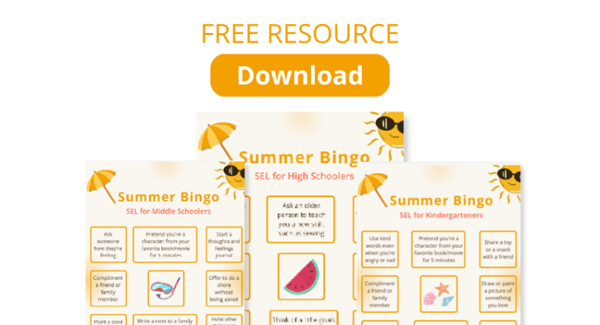Key takeaways
- Reading, volunteering, and summer camps are all great examples of ways young learners can continue their academic, social, and emotional development over the summer break.
- Educators should also be mindful of their own self-care over summer break.
Summer break can be a time of rest and relaxation for students, but it can also disrupt their flow of learning. After a long academic year, it’s important to ensure that students continue to progress in their academic and social emotional growth during this time. This is why educators, such as teachers and counselors, and caregivers should take proactive steps to help children maintain their educational momentum and emotional wellbeing over the summer. In this blog, we will discuss some tips to make sure summer break doesn't disrupt students' flow of learning.
 Tip #1: Encourage Reading
Tip #1: Encourage Reading
One of the best ways to ensure that students continue learning during the summer is to encourage them to read. Reading not only helps students maintain their academic skills, but it also promotes creativity and imagination. Teachers and counselors can recommend books to their students based on their interests and abilities. Caregivers can also encourage children to read during summer by taking them to the library to select books that match their interests, or that even explore new ones. Furthermore, caregivers can make reading a more fun and engaging experience by turning it into a group activity - sitting down and reading with young children is a great way to develop both their social emotional and reading skills.
Tip #2: Offer Summer Learning Programs
Many schools and community organizations offer summer learning programs that focus on specific subjects such as math, science, and reading. These programs can help students stay on track with their academic skills and provide them with opportunities to explore new topics. Teachers and counselors can help their students enroll in these programs or recommend them to caregivers based on their skill gaps and/or interests.
Tip #3: Suggest Volunteering
Volunteering is a great way for students to develop social emotional skills, especially social awareness, while also strengthening their community engagement. Encourage students to volunteer in activities that align with their interests and values. For example, older students who are interested in animals could volunteer at a local animal shelter, while those who are passionate about the environment could volunteer at a park or beach cleanup. For young learners, helping their caregivers with chores around the house or garden, or even helping neighbors with different age-appropriate tasks, are ideal ways to keep physically and mentally active over the break.
Read: Why young learners need to feel a sense of belonging in their school communities
 Tip #4: Encourage Physical Activity
Tip #4: Encourage Physical Activity
Physical activity is important for both physical and mental health. Encourage students to engage in physical activities that they enjoy, such as playing sports, swimming, or even just walking the dog! Counselors and teachers could also recommend summer camps or programs that focus on physical activity and team building.
Tip #5: Help Students Set Goals
Setting goals can help students stay motivated and focused during the summer. Teachers and counselors can help their students set academic and personal goals for the summer. These goals can be as simple as reading a certain number of books, learning a new skill, or journaling several times a week. Encourage students to track their progress and celebrate their achievements.
Teachers and counselors can help their students maintain their educational momentum and emotional wellbeing over the summer by encouraging reading, offering summer learning programs, suggesting volunteering, encouraging physical activity, and helping students set goals. By implementing these strategies, students can continue to grow and learn during the summer break and be ready to hit the ground running when they return to school.
And don’t forget: educators should also be mindful of their own self-care during the summer break. Taking time for self-care can help recharge and be better equipped to support students when the new school year begins.
Author: Fern Dinsdale
Posted: 09 May 2023
Estimated time to read: 3 mins
